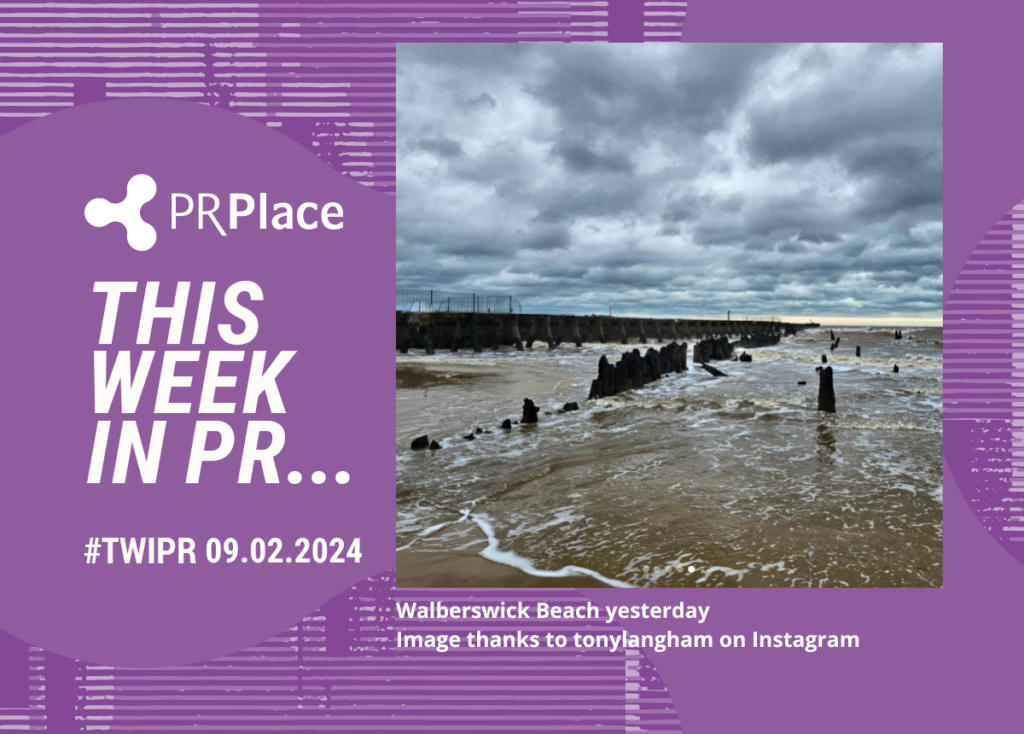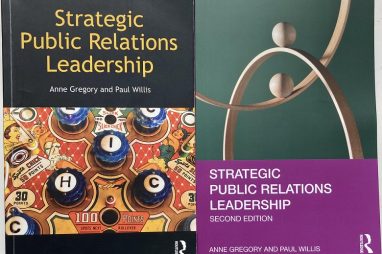This week in PR (9 February)

About the author
Richard Bailey Hon FCIPR is editor of PR Academy's PR Place Insights. He teaches and assesses undergraduate, postgraduate and professional students.

It happened this week
- Executive director of UK government communications Alex Aiken is leaving the Civil Service after 12 years to take up a new advisory role in the United Arab Emirates (PRovoke Media reports). Meanwhile his wife Nickie Aiken is one of 59 Conservative MPs to have announced they are standing down at the forthcoming election.
Profession and ethics
- Emma Duke: PR’s role in the biggest election year in history (no date)
‘We are now in a situation where trust in the media is at historically low levels and news avoidance is rife. Ironically the result of, and resulting in, the decline of the media sector globally; posing new opportunities and challenges for Public Relations professionals.’
Consulting, skills and careers
- Lamyah Kalimi: Curiosity – how it’s enabled acquiring skills for life (8 February)
‘I can confidently say that embracing curiosity has driven personal and professional growth. Throughout my apprenticeship at Headland, I have not only developed practical skills in PR like copy writing, media management, data analysis and compiling notes, but also cultivated essential life skills that will serve me in the years to come such as active listening.’ - Heather Yaxley: The future of PR freelancing: Experts, entrepreneurs and flexibly (7 February)
‘Nearly half of the global workforce is freelancing. In the UK, ONS data shows self-employment reached a peak of 5 million at the end of 2019 (15.3% of total employment).’ - Chris Lee: Going Freelance: Lessons for New Independent PR Practitioners (6 February)
‘Freelance life has its pros and cons and its ups and downs. It’s not for everyone, and it can take time to build up work if you haven’t already got a starter client.’ - Frankie Oliver and John Harrington with Esther Carder : ‘Agencies be brave, hold firm on client fees’ – PRWeek podcast (7 February)
‘PR margins tend to hold up very well against the other [marketing services] sectors. If you can keep your staff costs within 60% then you should generate a good margin.’ - Sarah Baxendale: Kick-starting my career with a CGS Apprenticeship (5 February)
‘What attracted me to an apprenticeship, rather than a degree, was the prospect of kick-starting my career whilst earning a salary and still gaining a qualification at the end. The work and learning balances out to be four days a week in the workplace and one designated day to carry out my assignments and studying.’
Gender, diversity, health and wellbeing
- Alastair McCapra: Don’t ‘do more’, do better: The CIPR’s journey to the National Equality Standard (8 February)
‘Deciding to go for NES accreditation was a big decision for the CIPR because it forced us to change our game. Before, I thought of equality, diversity and inclusion (EDI) as a background philosophy which informed our general working practices and sporadic improvement initiatives. I did not think of it as a kind of quality assurance system ensuring that we were consistent and accountable across everything we did.’ - Elizabeth Bananuka: The value of networks and partnerships (aka in praise of five white guys) (7 February)
‘Unlike other leadership courses, I wanted The Xec. to give our Black, Asian, mixed race and ethnic minority future leaders the chance to learn from the best in the business, from experts at the top of their game, and from practice rather than theory.’
- Sheeraz Gulsher: Closing the gap: the invaluable role of diversity in PR (6 February)
‘There is no mandatory regulation for companies in the private sector to report their ethnicity pay gap. While the Government has set out voluntary guidance for companies to record their ethnicity pay gap data, this simply does not go far enough.’
- Dan Gold: Elevating Social Mobility in PR with Stephen and Sarah Waddington [podcast] (6 February)
‘DE&I initiatives tend to focus initially on ethnicity, but the socio-economic dimension is also important. It’s important to us personally because we’re both from working class backgrounds with a Comprehensive School education.’
Public and third sectors
- Dan Slee: CRISIS COMMS: A social care story of ignorance and anger played out online (6 February)
‘I had a moment of clarity a few years into that local government comms job. In short it was this: ‘I can give advice but if they want to ignore it that’s on them.’
Politics, public affairs and public sphere
- Rebecca Coleman: King Charles’ cancer diagnosis opens dialogue on public health (6 February)
‘Ongoing coverage of the King’s health has felt uncomfortable at times – balancing the fine line between public interest and personal privacy that the Royal Family has always attempted to navigate. Discussing cancer is uncomfortable too, despite it being incredibly common.’
- Lucy Fyler, Rose Olwell, Giandomenico Di Girolamo and David Lampietti: Transatlantic Takes: Portland’s guide to the US primary elections (6 February)
‘This year’s Caucus, while traditional in appearance, was unique in its outcome. Former President Donald Trump’s unprecedented margin of victory, amidst legal and political conflicts, sent a message across the world: the presidential election will likely have the same candidates as 2020, but the outcome is anything but predetermined.’
Brands, content, community and creativity
- Abbey Crawford: #ConsumerCorner: The ‘Taylor Swift effect’ – how music’s anti-hero gave the economy a shake up (6 February)
‘With women influencing or controlling 85% of consumer spending, businesses are starting to recognise the importance of speaking to women in their language —characterised by authenticity and empowerment. From sports to financial services, industries are awakening to the potential of catering to women’s preferences and perspectives, tapping into a demographic that has long-been underestimated and should be at the forefront of marketer’s considerations.’ - Son Pham: What is left of brands’ personality when internet culture fades away? (6 February)
‘The lifestyle era is passing by. Coined by researcher and technologist Toby Shorin, this era was about brands, culture and supply chains tied together by technology in the 2010s which resulted in a particular organisation of culture. This era was never about creating culture, it was about attaching brands to existing cultural contexts.’
Research, data, measurement and evaluation
- Stella Bayles with Steph Bridgeman: How to prove PR value in 2024 [podcast] (no date)
‘The evaluation market has matured. There’s a clarity now around how we report data and presentation of results. It’s about automation; it’s also about globalised teams across different locations and functions; it’s about looking beyond media coverage. It’s about blended data sets.’
Crisis, risk and reputation
Behaviour and influence
Internal communication
INTERNAL COMMUNICATION DIPLOMA
- Stephen Waddington: The developing case for internal comms in management (8 February)
‘According to the [Gallagher State of the Sector] report, the business case for internal communication is based on contribution to culture, strategic alignment, channel optimisation, evidence of value and ultimately profitability drivers such as engagement [and productivity].’ - Katie Macaulay with Mike Pounsford, Howard Krais and Kevin Ruck: The sound of success: Why it pays to listen to employees [podcast] (7 February)
‘Companies are looking at how they change and how they get competitive advantage, but recognising that 70% of change programmes don’t deliver, companies are saying, “we’ve got to do things differently,” there’s just a move to giving employees greater voice and recognition that people have a view which actually can help the business to change and change successfully.’
- Dan Holden: Creating sustainable futures for internal communicators (4 February)
‘The IoIC report takes us beyond the environment, highlighting five types of sustainability. These can be helpful for internal communicators to work with stakeholders to identify the key activities happening within their organisations, rather than trying to fit every initiative under the generalised sustainability banner.’
- Rachel Miller: Why 2024 is the year of relevancy (2 February)
‘Want to know if channels are working well? Test how relevant they feel for employees. Not sure if they are? Ask your employees.’
Media, digital and technology
- Tom Flynn: SEC Newgate AI Weekly (8 February)
‘Those of us who use [Google] Bard regularly have noticed a serious improvement in performance over the past few weeks and hopefully the improvements will keep coming.’ - Neville Hobson: Digital Walls: Boundaries in the Evolution of the Public Square (7 February)
‘Is it the end of social networking as we know it? No more public squares but lots of private ones?’
- Stephen Davies: The current state of large language models (6 February)
‘It appears we’re entering a period where the future means we will have either a select group of foundation models or one LLM to rule them all. The outcome of which is currently undecided.’


